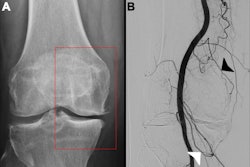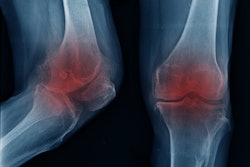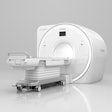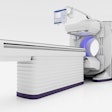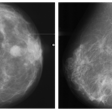CHICAGO -- For patients who do not respond to initial treatments for symptomatic knee osteoarthritis, genicular artery embolization (GAE) by an interventional radiologist (IR) is a potentially effective alternative for knee replacement surgery or long-term medication, according to a poster presented December 3 at the RSNA meeting.
 Florian Fleckenstein, MD. Image courtesy of the RSNA.
Florian Fleckenstein, MD. Image courtesy of the RSNA.
Florian Fleckenstein, MD, and a team of researchers at Charité -- University Hospital Berlin in Germany received an RSNA 2024 Trainee Research Prize for their retrospective, single-center study of 403 cases from patients (age range, 40 to 90 years; median age, 69) with moderate to severe knee osteoarthritis who underwent GAE. Their study evaluated the safety and efficacy of the novel interventional procedure for the treatment of symptomatic knee osteoarthritis.
GAE is thought to reduce synovial inflammation and could be especially beneficial for those with moderate to severe knee osteoarthritis assessed as Kellgren-Lawrence grade 2 to 4, according to Fleckenstein and the study's co-authors, Timo Alexander Auer, MD; Bernd Hamm, MD; Bernhard Gebauer, MD; and Federico Collettini, MD.
A GAE procedure involves an interventional radiologist injecting small particles into selected arterial branches that supply blood to the lining of the knee and correspond to the site of knee pain. The procedure blocks blood flow to that area, embolizing the abnormal blood vessels to hopefully disrupt the cycle of inflammation, cartilage destruction, and sensory nerve growth that characterizes osteoarthritis.
For the study, Fleckenstein's team evaluated baseline pain using the visual analog scale (VAS) and symptom scores according to the Knee Injury and Osteoarthritis Outcome Score (KOOS). The study then called for femoral arterial access using a 4-French sheath and embolization using the drugs Imipenem and Cilastatin.
The radiologists used digital subtraction angiography (DSA), in correlation with the patients' pain points, to visualize blood vessels during the procedure, according to details at RSNA.
 Peri-interventional digital subtraction angiography (DSA) of the descending genicular artery (DSA), a diagnostic procedure to view the inner surface of blood vessels, (green arrow) in a patient with symptomatic knee osteoarthritis of the right leg. On the left, the pre-interventional image with a clearly visible hyperemic blush (red box). On the right, the post-interventional DSA after embolization with Imepenem-Cilastatin. A completely eliminated blush is observed while preserving skin collaterals (orange arrows). Image courtesy of the RSNA.
Peri-interventional digital subtraction angiography (DSA) of the descending genicular artery (DSA), a diagnostic procedure to view the inner surface of blood vessels, (green arrow) in a patient with symptomatic knee osteoarthritis of the right leg. On the left, the pre-interventional image with a clearly visible hyperemic blush (red box). On the right, the post-interventional DSA after embolization with Imepenem-Cilastatin. A completely eliminated blush is observed while preserving skin collaterals (orange arrows). Image courtesy of the RSNA.
Prior to GAE, knee osteoarthritis severity was grade 2 in 12% of cases, grade 3 in 41%, and grade 4 in 47%. Six weeks, three months, and six months after the procedure, the team discovered four benefits from their GAE procedure:
- Technical success was achieved in 100% of procedures.
- Transient skin discoloration and transient mild knee pain after the procedure were noted in 18% of all cases, as expected.
- No severe complications were reported.
- The KOOS quality of life index and VAS improved by 87% and 71%, respectively, at six months from a median baseline of 57 (of 100) and 7 (of 10), respectively, according to data shared for RSNA 2024.
Moreover, the study supports standardization of GAE as a routine treatment for knee osteoarthritis, according to the team.
"GAE has the potential to reduce the need for more invasive surgeries, lower health care costs, and significantly improve the quality of life for countless individuals suffering from knee osteoarthritis," Fleckenstein said in an RSNA statement. He added that his team plans to continue their research on degenerative joint disorders.
The researchers hope that by demonstrating the procedure's success in a large and diverse patient population, the study could influence medical practice and policy, encouraging broader adoption of GAE in clinical settings worldwide.






